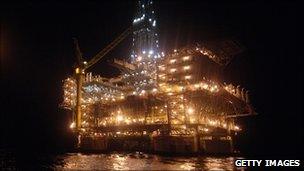Alex Salmond proposes plan to limit UK oil tax hike
- Published

Alex Salmond said North Sea oil industry investment was at risk
Scottish First Minister Alex Salmond has announced proposals to limit North Sea oil and gas tax hikes, which he said would hit industry investment.
Chancellor George Osborne raised the supplementary tax on North Sea oil production from 20% to 32%, worth 拢2bn, to fund a cut in fuel duty.
Trade body Oil and Gas UK said it could cost the industry 拢50bn over 10 years.
Mr Salmond said companies should be allowed a minimum rate of return, before the tax is levied.
Scottish Labour leader Iain Gray endorsed the proposed reforms, but environmental groups criticised any move to help the oil industry.
Mr Salmond's proposal was .
The Treasury said it expected offshore company profits to remain high but, if an impact on investment was identified, it would consider using allowances to tackle the problem.
It said it would also continue to liaise with the oil and gas industry on setting the level of its fair fuel stabiliser, where taxes would fall to reflect a cut in the oil price.
The Scottish government's options, based on proposals from Aberdeen University professor Alex Kemp, include:
An investment rate of return allowance, Mr Salmond's preferred option, guaranteeing companies a minimum rate of return on their investment before the tax is levied
An investment uplift allowance, where company investment costs are up-rated by a fixed proportion, rather than on an annual basis
Extended field allowances, a less flexible option which is indirectly linked to a field's investment costs and cut the amount of tax a company pays on its profits
Mr Salmond said: "North Sea oil and gas makes a huge contribution to the Scottish and UK economies - providing jobs, investment and the majority of these islands' oil and gas needs.
"It has also provided over 拢300bn worth of tax revenue to the UK government, with the Treasury due to secure around 拢13.4bn this year.
"With some 30-40% of oil and gas reserves still to be extracted, it is essential that companies who are investing in the more marginal fields, where exploration and extraction is technically more difficult, are not penalised.
'Dirty business'
"Unfortunately the uniform hike in the supplementary charge does just that."
Richard Dixon, director of WWF Scotland, claimed most political parties were "in denial" about the oil and gas industry's contribution to climate change.
"Instead of finding new ways to prop up the climate-trashing oil industry, governments should be concentrating on action to end our addiction to fossil fuels by speeding up the transition to clean renewable energy," he said.
Friends of the Earth Scotland chief executive, Stan Blackley, added: "Alex Salmond is proposing tax breaks for the big oil companies so they can continue their dirty business while making massive profits.
"Instead of pushing for tax breaks for oil companies, the first minister should be focusing on delivering his own government's ambitious renewable energy targets and creating the long-term jobs and opportunities that will come from this."
- Published27 May 2011
- Published26 May 2011